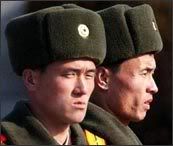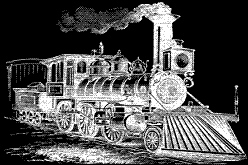Korean Border: Tension Builds, Shots Fired
October 7, 2006
 Shots were fired Saturday along the heavily armed no man's land separating the divided Koreas as regional tensions mounted in anticipation of communist North Korea's plan to test its first atomic bomb.
Shots were fired Saturday along the heavily armed no man's land separating the divided Koreas as regional tensions mounted in anticipation of communist North Korea's plan to test its first atomic bomb.
South Korean soldiers fired warning shots shortly before noon (0300 GMT) after five North Korean soldiers crossed a boundary in the Demilitarized Zone separating the two country's forces, South Korean military officials said.
It was unclear whether the North Korean advance was intended as a provocation, an official at South Korea's Joint Chiefs of Staff said on condition of anonymity, citing official policy. No one was hurt, and the North Koreans retreated.
"It's not clear whether it was intentional or whether it was to catch fish," he said, adding that four North Koreans were unarmed, and the fifth carried a rifle.
The North Korean soldiers advanced about 30 meters (30 yards) past the Military Demarcation Line separating the two armies before retreating to their own side after South Korean forces fired about 40 warning shots, the official said.
Earlier in the day, North Korea's neighbors applauded a U.N. Security Council statement warning the country not to test its first nuclear weapon, with South Korea backing the move and Japan saying it will push for punitive measures if Pyongyang doesn't heed international opinion.
The council adopted the statement on Friday urging North Korea to halt its threatened nuclear test, which could come as early as Sunday, and return immediately to talks on scrapping its nuclear weapons program, warning of unspecified consequences.
South Korea's Foreign Ministry issued a statement Saturday saying it supported the appeal and urging its isolated, communist neighbor to return to long-stalled six-nation talks on ending North Korea's nuclear weapons program.
"North Korea must clearly recognize that a nuclear test would not help the North itself in any way," South Korea said. "North Korea should be held responsible for any consequences that could be caused by a test."
Stepping up shuttle diplomacy, South Korea's nuclear envoy said he will visit Beijing on Monday for two days of talks with Chinese officials about the nuclear test.
In a separate statement from Tokyo, Japan's Foreign Ministry said it sees a possible nuclear test by North Korea as "a grave threat to the peace and security of northeast Asia and the world" and welcomed the statement.
"If North Korea conducts a nuclear weapons test despite the concerns expressed by international society, the Security Council must adopt a resolution outlining severely punitive measures," the ministry said.
The statement adopted unanimously Friday by the council expresses "deep concern" over North Korea's announcement Tuesday that it planned a test in a move that would confirm strong suspicions it is a nuclear power.
The warning was read at a formal meeting by the council president, Ambassador Kenzo Oshima of Japan, who indicated that the North could face sanctions or possible military action if it detonates a nuclear device.
The council acted amid speculation that a nuclear test could come on Sunday, the anniversary of North Korean leader Kim Jong Il's appointment as head of the Korean Workers' Party in 1997. (N. Korea 'eyes nuke test in mine')
Japanese Vice Foreign Minister Shotaro Yachi, currently in Washington, told Japan's TV Asahi, "Based on the development so far, it would be best to view that a test is possible this weekend."
With tensions rising, Kim met hundreds of top North Korean top military commanders and urged them to bolster the nation's defenses, as officers cheered, "Fight at the cost of our lives!" the North's official Korean Central News Agency reported Friday.
A North Korea expert in China, the North's closest ally, said only the removal of American economic sanctions against Pyongyang could dissuade the country from carrying out a nuclear test.
"North Korea has already made a decision to carry out a test," said Li Dunqiu, of China's State Council Development Research Center, a Cabinet-level think tank. But "if the U.S. removes sanctions ... then tensions can be eased. Otherwise launching a nuclear test is unavoidable for North Korea."
The United States imposed economic restrictions on North Korea last year to punish it for alleged counterfeiting and money laundering. Since late last year, North Korea has boycotted six-nation talks aimed at dismantling its nuclear ambitions.
North Korea said Tuesday it decided to act in the face of what it claimed was "the U.S. extreme threat of a nuclear war," but gave no date for the test. Washington has repeatedly said it has no intention of invading North Korea.
Both China and Russia have urged the United States and North Korea to hold talks.
But Russia's U.N. Ambassador Vitaly Churkin said U.S. Ambassador John Bolton informed the council that there would be no North Korean-U.S. talks except in the margins of resumed six-party talks.
Bolton said the Security Council needs to adopt a long-term strategy to deal with North Korea but the top U.S. priority now is to stop a nuclear test.
Oshima, the Japanese U.N. ambassador, had pressed to have the statement adopted before Japanese Prime Minister Shinzo Abe travels to China on Sunday and South Korea on Monday with a message that the North should stop testing.
 Shots were fired Saturday along the heavily armed no man's land separating the divided Koreas as regional tensions mounted in anticipation of communist North Korea's plan to test its first atomic bomb.
Shots were fired Saturday along the heavily armed no man's land separating the divided Koreas as regional tensions mounted in anticipation of communist North Korea's plan to test its first atomic bomb.South Korean soldiers fired warning shots shortly before noon (0300 GMT) after five North Korean soldiers crossed a boundary in the Demilitarized Zone separating the two country's forces, South Korean military officials said.
It was unclear whether the North Korean advance was intended as a provocation, an official at South Korea's Joint Chiefs of Staff said on condition of anonymity, citing official policy. No one was hurt, and the North Koreans retreated.
"It's not clear whether it was intentional or whether it was to catch fish," he said, adding that four North Koreans were unarmed, and the fifth carried a rifle.
The North Korean soldiers advanced about 30 meters (30 yards) past the Military Demarcation Line separating the two armies before retreating to their own side after South Korean forces fired about 40 warning shots, the official said.
Earlier in the day, North Korea's neighbors applauded a U.N. Security Council statement warning the country not to test its first nuclear weapon, with South Korea backing the move and Japan saying it will push for punitive measures if Pyongyang doesn't heed international opinion.
The council adopted the statement on Friday urging North Korea to halt its threatened nuclear test, which could come as early as Sunday, and return immediately to talks on scrapping its nuclear weapons program, warning of unspecified consequences.
South Korea's Foreign Ministry issued a statement Saturday saying it supported the appeal and urging its isolated, communist neighbor to return to long-stalled six-nation talks on ending North Korea's nuclear weapons program.
"North Korea must clearly recognize that a nuclear test would not help the North itself in any way," South Korea said. "North Korea should be held responsible for any consequences that could be caused by a test."
Stepping up shuttle diplomacy, South Korea's nuclear envoy said he will visit Beijing on Monday for two days of talks with Chinese officials about the nuclear test.
In a separate statement from Tokyo, Japan's Foreign Ministry said it sees a possible nuclear test by North Korea as "a grave threat to the peace and security of northeast Asia and the world" and welcomed the statement.
"If North Korea conducts a nuclear weapons test despite the concerns expressed by international society, the Security Council must adopt a resolution outlining severely punitive measures," the ministry said.
The statement adopted unanimously Friday by the council expresses "deep concern" over North Korea's announcement Tuesday that it planned a test in a move that would confirm strong suspicions it is a nuclear power.
The warning was read at a formal meeting by the council president, Ambassador Kenzo Oshima of Japan, who indicated that the North could face sanctions or possible military action if it detonates a nuclear device.
The council acted amid speculation that a nuclear test could come on Sunday, the anniversary of North Korean leader Kim Jong Il's appointment as head of the Korean Workers' Party in 1997. (N. Korea 'eyes nuke test in mine')
Japanese Vice Foreign Minister Shotaro Yachi, currently in Washington, told Japan's TV Asahi, "Based on the development so far, it would be best to view that a test is possible this weekend."
With tensions rising, Kim met hundreds of top North Korean top military commanders and urged them to bolster the nation's defenses, as officers cheered, "Fight at the cost of our lives!" the North's official Korean Central News Agency reported Friday.
A North Korea expert in China, the North's closest ally, said only the removal of American economic sanctions against Pyongyang could dissuade the country from carrying out a nuclear test.
"North Korea has already made a decision to carry out a test," said Li Dunqiu, of China's State Council Development Research Center, a Cabinet-level think tank. But "if the U.S. removes sanctions ... then tensions can be eased. Otherwise launching a nuclear test is unavoidable for North Korea."
The United States imposed economic restrictions on North Korea last year to punish it for alleged counterfeiting and money laundering. Since late last year, North Korea has boycotted six-nation talks aimed at dismantling its nuclear ambitions.
North Korea said Tuesday it decided to act in the face of what it claimed was "the U.S. extreme threat of a nuclear war," but gave no date for the test. Washington has repeatedly said it has no intention of invading North Korea.
Both China and Russia have urged the United States and North Korea to hold talks.
But Russia's U.N. Ambassador Vitaly Churkin said U.S. Ambassador John Bolton informed the council that there would be no North Korean-U.S. talks except in the margins of resumed six-party talks.
Bolton said the Security Council needs to adopt a long-term strategy to deal with North Korea but the top U.S. priority now is to stop a nuclear test.
Oshima, the Japanese U.N. ambassador, had pressed to have the statement adopted before Japanese Prime Minister Shinzo Abe travels to China on Sunday and South Korea on Monday with a message that the North should stop testing.




0 Comments:
Post a Comment
<< Home